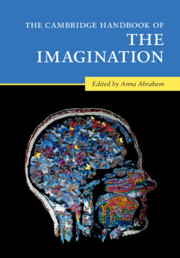Book contents
- The Cambridge Handbook of the Imagination
- The Cambridge Handbook of the Imagination
- Copyright page
- Dedication
- Contents
- Figures
- Contributors
- Acknowledgments
- 1 Surveying the Imagination Landscape
- Part I Theoretical Perspectives on the Imagination
- Part II Imagery-Based Forms of the Imagination
- Part III Intentionality-Based Forms of the Imagination
- Part IV Novel Combinatorial Forms of the Imagination
- Part V Phenomenology-Based Forms of the Imagination
- 34 Imagination in the Philosophy of Art
- 35 Imagination in Aesthetic Experience
- 36 The Arts and Human Symbolic Cognition: Art is for Social Communication
- 37 Aesthetic Engagement: Lessons from Art History, Neuroscience, and Society
- 38 Dance and the Imagination: Be a Butterfly!
- 39 Imagination, Intersubjectivity, and a Musical Therapeutic Process: A Personal Narrative
- Part VI Altered States of the Imagination
- Name Index
- Subject Index
- References
39 - Imagination, Intersubjectivity, and a Musical Therapeutic Process: A Personal Narrative
from Part V - Phenomenology-Based Forms of the Imagination
Published online by Cambridge University Press: 26 May 2020
- The Cambridge Handbook of the Imagination
- The Cambridge Handbook of the Imagination
- Copyright page
- Dedication
- Contents
- Figures
- Contributors
- Acknowledgments
- 1 Surveying the Imagination Landscape
- Part I Theoretical Perspectives on the Imagination
- Part II Imagery-Based Forms of the Imagination
- Part III Intentionality-Based Forms of the Imagination
- Part IV Novel Combinatorial Forms of the Imagination
- Part V Phenomenology-Based Forms of the Imagination
- 34 Imagination in the Philosophy of Art
- 35 Imagination in Aesthetic Experience
- 36 The Arts and Human Symbolic Cognition: Art is for Social Communication
- 37 Aesthetic Engagement: Lessons from Art History, Neuroscience, and Society
- 38 Dance and the Imagination: Be a Butterfly!
- 39 Imagination, Intersubjectivity, and a Musical Therapeutic Process: A Personal Narrative
- Part VI Altered States of the Imagination
- Name Index
- Subject Index
- References
Summary
This chapter is concerned with the relationship between imagination, communicative musicality, intersubjectivity, and therapeutic practice. It begins with a personal account of the history of the theory of Communicative Musicality, tracing its origins in the domains of psychology and psychobiology (including the study of child development), psychiatry, and the neuroscience of emotion, with particular reference to the work of Colwyn Trevarthen, Daniel Stern, and Jaak Panksepp. There is discussion of the relationship between phenomenology and intersubjectivity, beginning with Husserl and Heidegger, and leading toward the work of Daniel Stern and the importance of the idea of the “present moment” in both psychotherapy and everyday human relationships. The chapter goes on to describe how the theory of communicative musicality and related psychology, psychobiology, psychiatry and neuroscience have influenced therapeutic creative work with children who are victims of conflict. There is discussion of the pathology of PTSD, including dysregulation of the autonomic nervous system, endocrine systems, movement repertoires and breathing, and the potential for communicative musicality to help alleviate both mental and physiological symptoms. The chapter ends with an example of work with imagination, communicative musicality, intersubjectivity, and therapeutic practice in the field, with Syrian refugee children in the Beqaa Valley, Lebanon.
Keywords
- Type
- Chapter
- Information
- The Cambridge Handbook of the Imagination , pp. 635 - 656Publisher: Cambridge University PressPrint publication year: 2020
References
- 2
- Cited by

